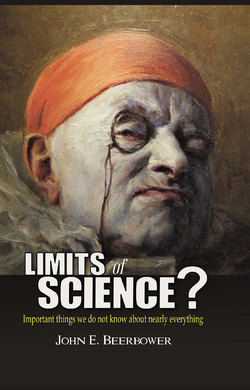Читать книгу Limits of Science? - John E. Beerbower - Страница 45
На сайте Литреса книга снята с продажи.
Laws of Nature and ceteris paribus
ОглавлениеAs also noted above, scientists have generally assumed that such Laws consist of relationships that obtain regardless of time and place and, in fact, independently of a vast number of characteristics of any particular environment.21 Id. Remember the discussion of the ceteris paribus condition above. What needed to remain the same were only the characteristics relevant to or that had an effect upon the causal relationship being examined. Laws of Nature are relationships as to which the relevant ceteris paribus factors exclude much of the aspects of the natural world that our senses are capable of detecting. If that were not so, then our inherent limitations would prevent us from identifying those Laws. Simplification and selectivity are necessities for the human mind to cope with our exceedingly rich and complex physical environment.
I have discussed the ceteris paribus condition above. The terminology might sound a bit strange in this context. That is because the theories of the physical sciences are not normally set forth in such language. Instead, most of our theories in the physical sciences are presented (often implicitly) in terms of subsystems, in the context of which everything else is assumed to be irrelevant. This fact is apparent whenever one simply looks at a mathematical model of a theory; there are only a finite, even if sometimes very large (and sometimes very small), number of variables utilized in the model. Often, for essentially all practical purposes, everything else is deemed irrelevant (or, in some cases, can be controlled for). But, such an approach implicitly contains the ceteris paribus condition.
For example, the Newtonian Laws of Motion focus on the particular bodies of interest. In doing so, they effectively assume that, for example, the gravitational forces arising from all other matter in the Universe do not exist. Where those other forces are very, very small or do not have a systematic influence on the matter under examination (do not consistently bias the results one way or another), the assumption is satisfactory, because the resulting predictions are sufficiently accurate for the purposes at hand.
However, the model incorporating those Laws is simply not a full or, therefore, accurate representation of reality. Indeed, all theories and all Laws of Nature are inevitably only approximations, since they apply only to subsystems and exclude the influences of everything else in the Universe. Smolin, Time Reborn, pp.38–39.
Of course, many theories are also only approximations even within the subsystems to which they apply, because they do not fully or accurately capture even the relationships that exist within the subsystem. Over time we find that our approximations become better and also, often, more inclusive (such as General Relativity compared to Newtonian mechanics), but even if they come actually to reflect the real relationships within the subsystems, they are still approximations from the standpoint of the Universe as a whole. Thus, one could argue that such Laws cannot, by definition (since they apply to subsystems or parts of the whole), be truly universal or timeless. One could then conclude that this type of limitation to our scientific theories will necessarily continue to exist until we have a complete theory of everything, a theory that is able to incorporate everything in and about the Universe, including time. Id., p.40.
We shall return several times in the following pages to discuss issues that arise with respect to a potential theory of everything.For now, one might say that if nature did not obey certain simple Natural Laws, we would not be able to understand it. See Barrow, Theories of Everything, pp.10–11. Of course, such an observation proves very little: we think we understand some natural phenomena, so those phenomena must be obeying Natural Laws; but, if we do not really understand those phenomena, but just think that we do, we can draw no relevant conclusions. Can it be just a human construct that has fooled us into thinking we understand the world?
